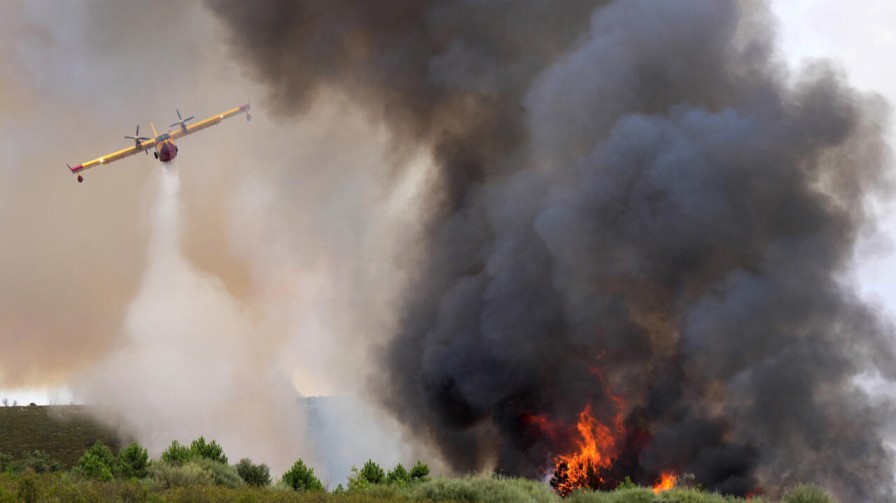EU sends firefighting planes as Spain battles deadly wildfires

Thousands of residents have been evacuated from their homes, including 700 people in the south-western province of Caceres on Wednesday.
The European Union has deployed two firefighting planes to Spain as wildfires continue to rage across the country, marking the first time Spain has activated the bloc's disaster assistance mechanism.
The move comes after a third person died due to the fires, and authorities warned that extreme heat and dry conditions could allow the blazes to spread further.
The two French Canadair water bomber aircraft arrived in Spain's north-western Galicia region on Thursday.
"The fight against fires knows no borders," said Pedro Blanco, a government representative in the region. "French resources are now in Spain to intensify efforts to extinguish forest fires."
Spain’s Interior Minister Fernando Grande-Marlaska told local media on Wednesday that the planes were not immediately needed but would be available for use as required. He added that he had not ruled out requesting additional firefighters.
A volunteer firefighter died in a hospital in León on Thursday after suffering severe burns, becoming the second volunteer to die in the region and the third overall.
Another person had died near Madrid last Tuesday. Prime Minister Pedro Sanchez expressed his grief, saying, "We are struck once again by the death of a second volunteer who has lost their life in León. All our love and support go out to their family and friends during this unbearable time."
Authorities have been taking action against suspected arsonists. Spain's Civil Guard reported that two men had been arrested on suspicion of starting fires in Castille and León, bringing the total number of arson arrests since June to ten. Wildfires in Spain can be triggered by barbecues, cigarette stubs, or discarded bottles, and causing a fire is a criminal offence, even if accidental.
Thousands of residents have been evacuated from their homes, including 700 people in the south-western province of Caceres on Wednesday.
Heatwaves are common in southern Europe during the summer, and current high temperatures of up to 44C, combined with moderate winds, are creating ideal conditions for wildfires to spread rapidly.
Across the EU, wildfires have burned around 629,000 hectares (1.6 million acres) so far this year, with fires in Spain making up about a quarter of that total.
Scientists say that while climate change cannot always be linked to individual events, it is causing heatwaves to become hotter, longer, and more frequent, which dries out vegetation and fuels fires.
Spain is the fifth EU country to request disaster assistance for wildfires. Greece, Bulgaria, Montenegro, and Albania have also activated the EU’s civil protection mechanism.
In Greece, wildfires have been burning for three consecutive days, particularly on the island of Chios and in the Achaia region of the Peloponnese.
At least 95 people, including firefighters and civilians, have been injured, and over 10,000 hectares (25,000 acres) have been affected since Tuesday morning.
Red alerts remain in place for Attica, eastern Central Greece, Evia, the north-eastern Peloponnese, and Thrace. Residents in Chios have been evacuated by sea using coastguard and private vessels due to the fire’s size and limited local resources.
Fires have also spread in Albania and Turkey, where several firefighters have been injured while attempting to control the blazes.
